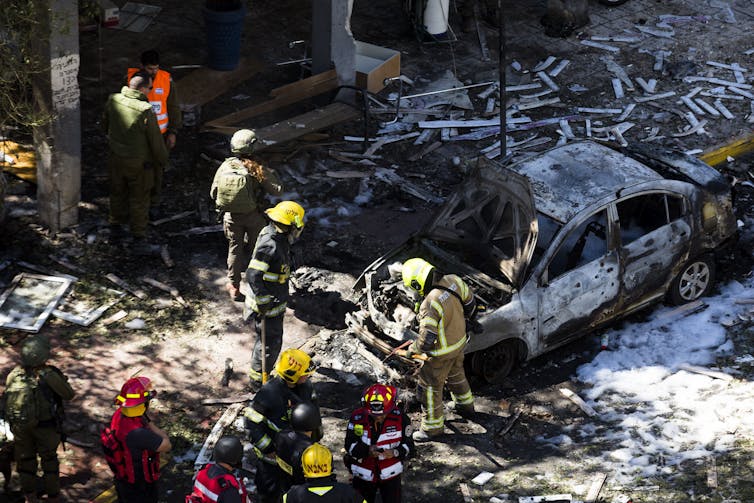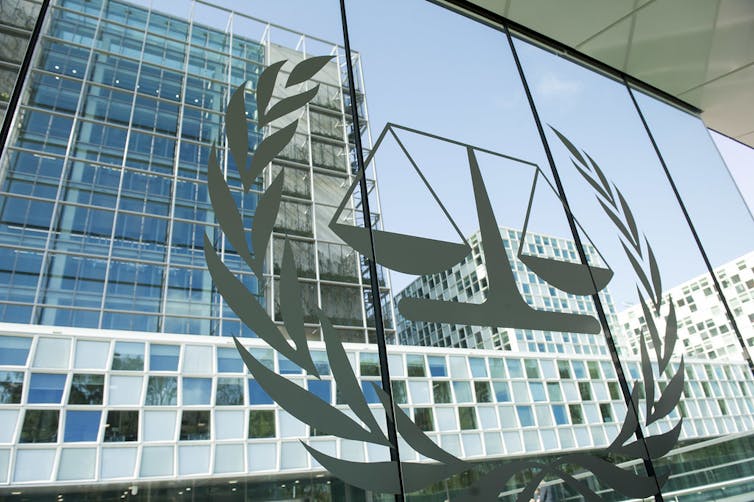By Asaf Lubin, The Conversation, May 20, 2021
The deadliest fighting in years between Israel and Hamas had by mid-May killed over 200 Palestinians in Gaza, including dozens of children, and at least 10 in Israel. Both sides are accused of violating international law – Israel for its alleged disproportionate bombardment of residential buildings and Palestinian groups for firing rockets on Israeli cities.
International law professor Asaf Lubin explains the rules of warfare – and whether they can be enforced.
1. Are wars governed by law?
International humanitarian law encompasses a set of rules which govern armed conflict. They are enshrined in treaties, some of which both Israel and Palestine ratified. The most important of these agreements are the 1949 Geneva Conventions and their 1977 additional protocols.
Central to international humanitarian law are a core set of principles.
First is the principle of distinction, which obligates warring parties to distinguish between civilians and military targets. Each side can attack only those objects which by their nature, location, purpose or use would offer a definite military advantage if neutralized.
Second is the principle of proportionality, according to which any unavoidable “collateral damage” – such as civilian deaths – cannot be excessive in relation to the direct military advantage anticipated.
Finally, there’s the principle of precautions in attack, which reaffirms the obligation of warring parties do everything feasible to mitigate civilian harms.
So when Hamas indiscriminately fires rockets at Tel Aviv, for example, it is a clear violation of international law. Similarly, Israeli attacks on residential high-rises are for many in the international community a war crime, because they are disproportionate and do not offer a definite military advantage.
Israel disagrees, claiming those buildings were used by Hamas to advance its military campaign. https://www.youtube.com/embed/bQjq802NX8g?wmode=transparent&start=0 Israel bombed a building that housed the media outlets Associated Press and Al Jazeera, as well as many Palestinian families.
2. What happens if Israel or Hamas is alleged to have committed war crimes?
That depends on the will of the international community. We may see an International Criminal Court investigation, U.N. Security Council sanctions or fact-finding missions by the U.N. Human Rights Council.
These kinds of investigations have happened after every previous cycle of violence between Israel and Hamas. Prior reports – like the 2009 Goldstone report, issued by the U.N. Human Rights Council – identified violations of human rights and humanitarian law by both parties. It called for Israel to provide monetary reparations to Palestinian victims or their survivors.
Enforcement, however, has proven largely ineffective. International law simply lacks the necessary tools to hold powerful countries to account.
3. Has Israel complied with the UN’s demands after such investigations?
To varying degrees. Israel in many of those cases did not accept the basic premise that its military practices violated international humanitarian law and therefore did not change course.
But in a few rare occasions Israel did pay compensation. For example, in 2009 Israel paid US$10.5 million to the U.N. for property damage and injuries suffered by the organization during Israel’s attack on Gaza.
When Israel makes such payments, they are done “ex gratia” – lump sum payments made to respond to international pressure without acknowledging any legal responsibility or creating legally binding norms that could be enforced in the future.
Israel is not alone in this practice. Other countries, including the U.S., have made similar ex gratia payments to those harmed in war, without admitting fault or wrongdoing.
4. What is the US position on Israel’s military action in Gaza?
The U.S. now says it supports a cease-fire. But it has blocked U.N. Security Council statements that would have called for such a cease-fire and put blame on Israel, including strong language about Palestinian children dying in large numbers. The U.S. claimed that it blocked those statements because they did not also condemn Hamas for violating international law.

It is a common U.S. stance in Israel-Hamas conflicts to require equality in language on “both sides.” But congressional progressives in the Democratic Party now take a different view. They insist that the U.S. must recognize the power imbalance between Israel, a U.S.-funded military superpower, and Gaza, an occupied territory.
5. Israel was already under International Criminal Court investigation for allegedly committing war crimes against Palestinians. Will the current conflict influence that case?
In March 2021, outgoing International Criminal Court prosecutor Fatou Bensouda opened an investigation into alleged disproportionate Israeli attacks in Gaza – exactly the same kind of attacks at issue now. The investigation also covers Israel’s settlements program in the West Bank.
In a recent interview, Bensouda said that the investigation remained open and that her office is monitoring the current situation very closely – essentially warning Israel to be careful, because the criminal court could hold it to account.
The ongoing violence shows that the threat didn’t deter either side. Israeli leaders often refer to a “legal iron dome” to indicate the general umbrella of protection Israel offers its military personnel from any future criminal prosecution.
6. Have Israel and the US joined the international treatises that establish the rules of war?
Yes, they both ratified the Geneva Conventions, but not their additional protocols. Nonetheless, the international community widely recognizes the rules set out in these agreements as customary law, and they are therefore binding on all countries regardless of whether they signed on.

7. If neither Israel nor the US complies with international humanitarian law, do these rules actually exist?
International law serves an expressive function, setting a standard for how countries should behave. Over time, we’ve seen these norms play an increasing role in the way countries operate – and what actions are deemed unacceptable.
For example, following the 2009 Goldstone report, Israel committed to making several changes to minimize civilian casualties, including restricting the use of white phosphorous munitions, which cause severe chemical burns.
International humanitarian law is not a panacea for all of the world’s ills. But these rules are a good place to start, and certainly worth fighting for.
Asaf Lubin is Associate Professor of Law, Indiana University





